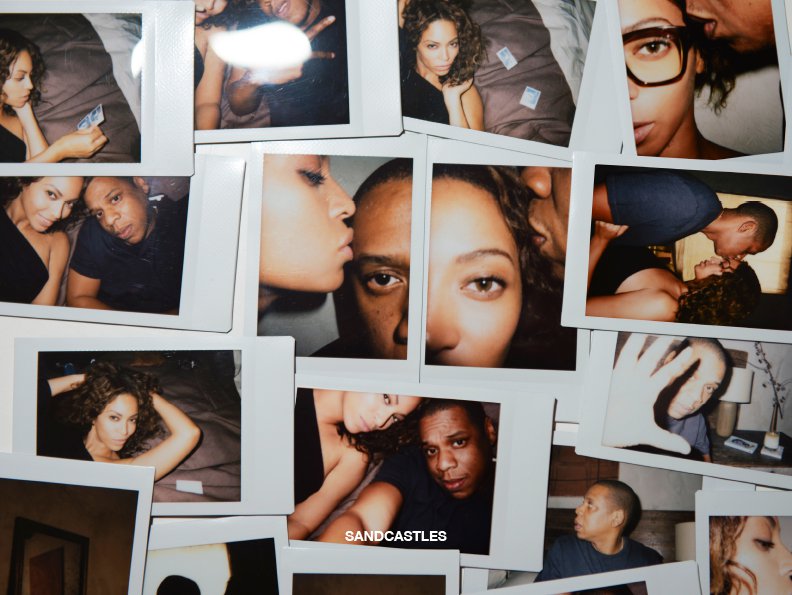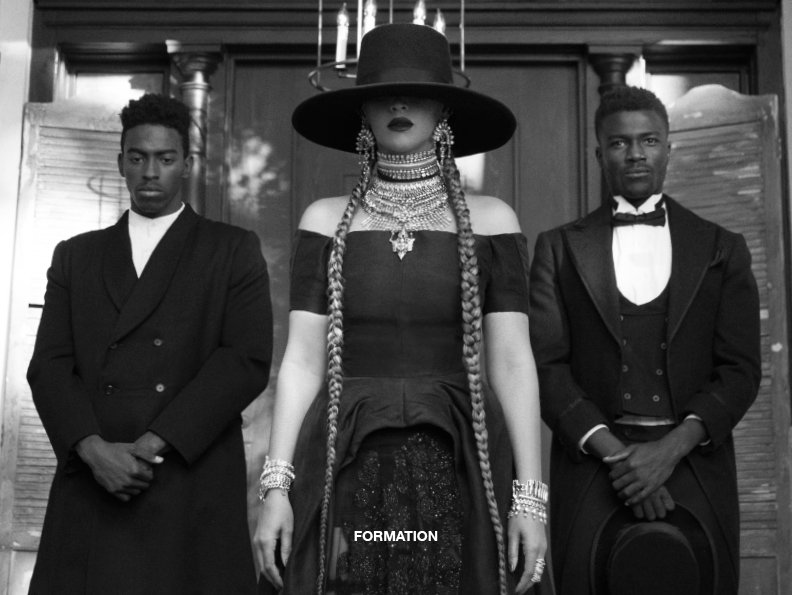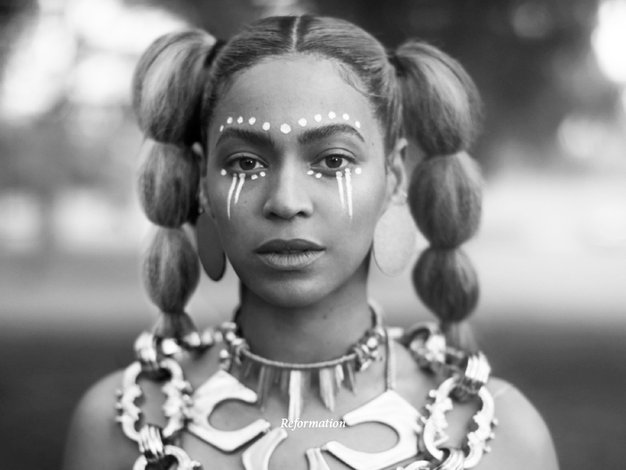

Infidelity and trauma in Black relationships
As a multimedia audiovisual artwork, Lemonade relates the emotional journey of Beyoncé after her husband Jay-Z's infidelity in a generational and racial context through its music, lyrics, visuals and poetry. The Lemonade album is a song cycle (referencing the classical compositional genre defined in German Lieder by Robert Schumann, Franz Schubert and Johannes Brahms) that is performed as an elaboration of the Kübler-Ross model, with the tracks (excluding "Formation") corresponding to the eleven chapters of the Lemonade film: "Intuition", "Denial", "Anger", "Apathy", "Emptiness", "Accountability", "Reformation", "Forgiveness", "Resurrection", "Hope", and "Redemption".
Melina Matsoukas, the director of the "Formation" music video, said that Beyoncé explained to her the concept behind Lemonade, stating: "She wanted to show the historical impact of slavery on black love, and what it has done to the black family, and black men and women—how we're almost socialized not to be together." Beyoncé wrote on this in a 2018 Vogue article about the "generational curses" in her family, explaining that she comes "from a lineage of broken male-female relationships, abuse of power, and mistrust", including a slave owner who married a slave. Beyoncé continues, writing "Only when I saw that clearly was I able to resolve those conflicts in my own relationship. Connecting to the past and knowing our history makes us both bruised and beautiful."
This theme is repeated throughout Lemonade, with Beyoncé's grief, trauma and struggle being connected to that of her family's ancestors. The fifth track "Daddy Lessons" acts as a turning point for the album, with Beyoncé linking Jay-Z cheating on her with her father Mathew Knowles cheating on her mother Tina. Towards the end of Lemonade, Beyoncé reveals the meaning behind the album title, showing Jay-Z's grandmother Hattie White saying "I had my ups and downs, but I always find the inner strength to pull myself up. I was served lemons, but I made lemonade", and describing her own grandmother, Agnez Deréon, as an "alchemist" who "spun gold out of this hard life" with the instructions to overcome these challenges passed down through generations like a lemonade recipe.

Black Feminism
Miriam Bale for Billboard called Lemonade "a revolutionary work of Black feminism" as "a movie made by a black woman, starring Black women, and for Black women", in which Beyoncé is seen gathering, uniting and leading Black women throughout the film. As well as relating the story of Beyoncé's relationship with her husband, Lemonade also chronicles the relationship between Black women and American society. The includes how the United States betrayed and continually mistreats Black women, with society needing to solve its problems in order to enable reformation and the rehabilitation of Black women. As part of reverting the societal oppression and silencing of Black women, Lemonade centralizes the experiences of Black women in a way that is not often seen in the media, and celebrates their achievements despite the adversity they face.
"Don't Hurt Yourself" contains a quote from Malcolm X in which he said "The most disrespected person in America is the Black woman. The most unprotected person in America is the Black woman. The most neglected person in America is the Black woman.” The Black female public figures that Beyoncé featured in the film all have successful careers despite experiencing misogynoir and racism in the media. The film also contains clips of everyday Black women from working class communities, bringing visibility to Black women who are often ignored and undermined by society. The film envisions a space where there was never oppression of Black women, whereby Beyoncé and other Black women form a self-sufficient community in which they can heal together. Lemonade also defies and dismantles stereotypical representations of Black women as monolithic and angry Black women, instead attributing them complexity, agency, strength and vulnerability.
To create Lemonade, Beyoncé drew from the work of a wide variety of Black women who are often overlooked or forgotten. The music draws inspiration from Black female blues musicians such as Shug Avery, Bessie Smith and Sister Rosetta Tharpe, who also used their personal trauma to empower Black women, as well as samples songs originally recorded by Black women, namely Memphis Minnie and Dionne Warwick, but whose most famous recordings are by male or white artists. The visuals drew inspiration from works by Black feminists such as Julie Dash's Daughters Of The Dust, Alice Walker's In Search Of Our Mothers' Gardens, and Toni Morrison's The Bluest Eye. Other influences for Lemonade include literary work by Black women focusing on themes including African-American folklore (such as Zora Neale Hurston's Their Eyes Were Watching God) and Afrofuturism (such as Octavia Butler's Kindred).

African-American history and culture
Beyoncé also uses Lemonade as a form of recognition, commemoration and celebration of the culture and history of Black people in the Deep South and in the United States as a whole. The film contains allusions to slavery, such as the House of Slaves' Door of No Return in Senegal and the dungeons of Elmina Castle in Ghana, where slaves were taken before being shipped to the Americas. In "Love Drought", Beyoncé walks with her dancers into the sea, alluding to the Igbo Landing of 1803, where Igbo slaves took control of their slave ship, and rather than submit to slavery, marched into the sea while singing in Igbo, drowning themselves. Beyoncé appears wearing a tignon, in reference to Louisiana's tignon laws implemented in 1786 that limited African-American women's dress in order to maintain the state's racist social hierarchies. The film also contains references to African religion and spirituality, such as Yoruba ori body paint in "Sorry", allusions to the loa Erzulie Red-Eyes in "Don't Hurt Yourself", and Beyoncé's initiation into the Santería religion and embodiment of the Yoruba orisha Oshun in "Hold Up". Allusions to New Orleans culture include "Queen of Creole cuisine" Leah Chase, the Edna Karr Marching Band, jazz funerals, Mardi Gras Indians and the Superdome.
Beyoncé is seen with other Black women on plantations in Lemonade. In the "Formation" video, the walls of the plantation houses are covered with French Renaissance-style portraits of Black subjects; director Melina Matsoukas states that "films about slavery traditionally feature white people in these roles of power and position. I wanted to turn those images on their head." Towards the end of Lemonade, Beyoncé and several Black women are on a plantation, with Chris Kelly for Fact writing "Instead of an antebellum memory, these scenes portray a dream: the fantasy of an all-Black, matriarchal utopia when women dress up, prepare meals, take photographs and perform shows, not for a master but for themselves." Throughout the film, Beyoncé can be seen in Fort Macomb, a Confederate States Army stronghold that was taken over by one of the first all-Black Union Army units - the 1st Louisiana Native Guard - and eventually destroyed by Hurricane Katrina. On the central track "Daddy Lessons", Beyoncé is seen standing in a hideaway in the fort, alluding to the Underground Railroad. However, on the closer "All Night", Beyoncé is seen above ground, walking on top of the ruins of the fort in an antebellum-style dress made in West African material, possibly inspired by artist Yinka Shonibare who is known for reappropriating "European import — the cloth — to remake symbols of European cultural dominance in the spirit of Africa".
On "Don't Hurt Yourself", Beyoncé samples Led Zeppelin’s "When the Levee Breaks". However, the classic rock song was originally written by black Delta blues artists Kansas Joe McCoy and Memphis Minnie, with the song referring to the Great Mississippi Flood of 1927 which displaced hundreds of thousands of African Americans. With the sample, Beyoncé reappropriates the song that was written by Black people about black history. In general, Beyoncé also reappropriates genres that were influenced by African Americans that are now seen as predominantly white genres on Lemonade, such as rock in "Don't Hurt Yourself" and country in "Daddy Lessons".